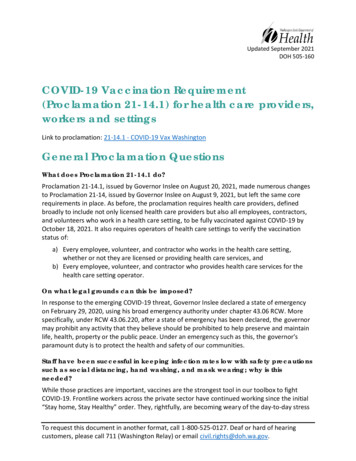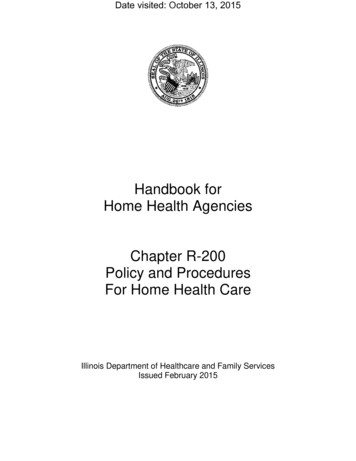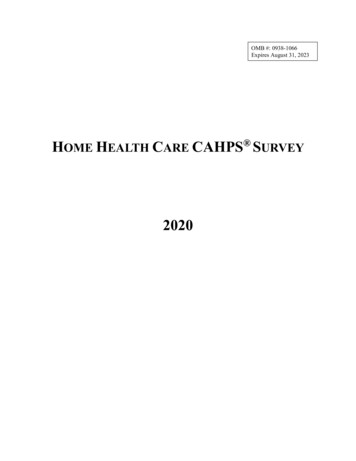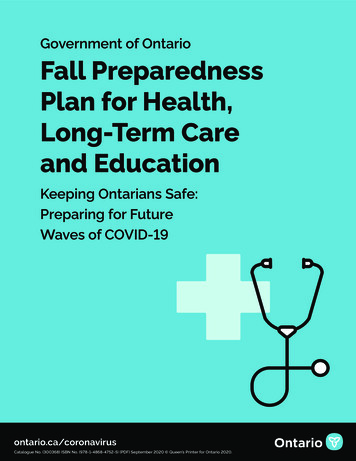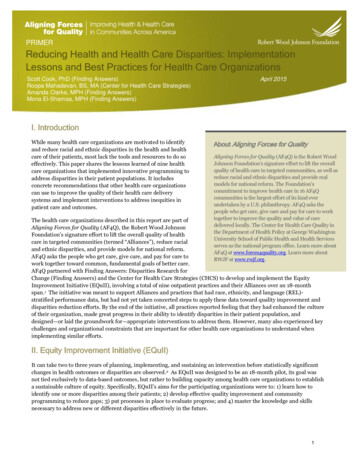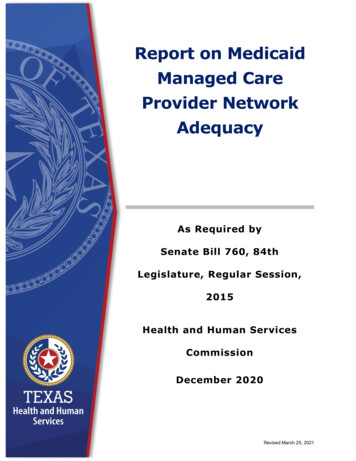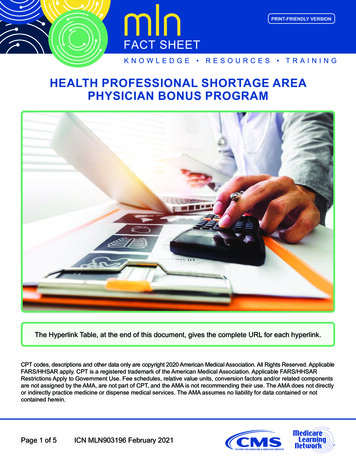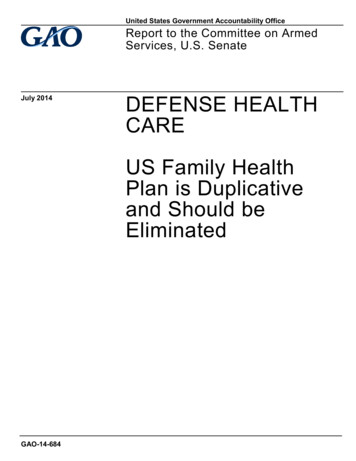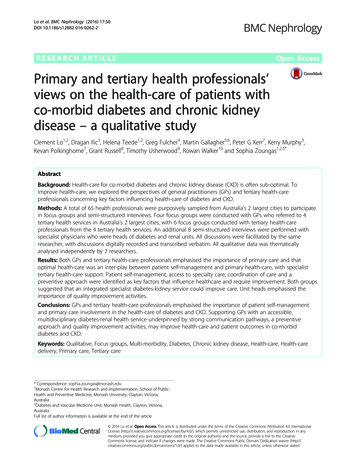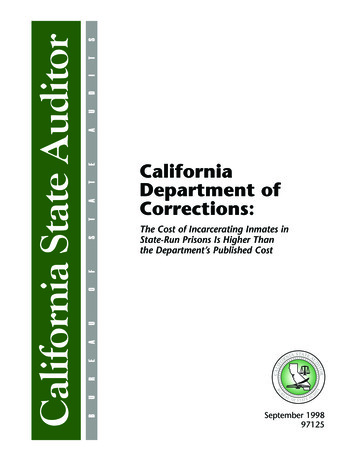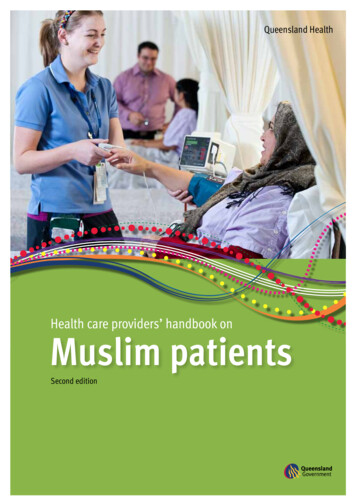
Transcription
Queensland HealthHealth care providers’ handbook onMuslim patientsSecond edition
State of Queensland (Queensland Health) 2010.This document is licensed under a Creative CommonsAttribution Non-Commercial 2.5 Australia licence. To viewa copy of this licence, visit www.creativecommons.org/licenses/by-nc/2.5/au. You are free to copy, communicateand adapt the work for non-commercial purposes, aslong as you attribute Queensland Health and the IslamicCouncil of Queensland.For permissions beyond the scope of this licence contact:Intellectual Property OfficerQueensland HealthGPO Box 48Brisbane Queensland 4001Email: IP Officer@health.qld.gov.auPhone 07 3234 1479For further information contact:Queensland Health Multicultural ServicesDivision of the Chief Health OfficerQueensland HealthPO Box 2368Fortitude Valley BC Queensland 4006Email: multicultural@health.qld.gov.auorIslamic Council of QueenslandPO Box 204Sunnybank Queensland 4109Email: icqi@bigpond.comSuggested citation:Queensland Health and Islamic Council of Queensland.Health Care Providers’ Handbook on Muslim PatientsSecond Edition 2010. Division of the Chief Health Officer,Queensland Health, Brisbane 2010.2Health care providers’ handbook on Muslim patients
Table of contentsPreface . . . . . . . . . . . . . . . . . . . . . . . . . . . . . . . . . . . . . . . . . . . . . . . . . . . . . 4Introduction . . . . . . . . . . . . . . . . . . . . . . . . . . . . . . . . . . . . . . . . . . . . . . . . . 5Section one: Guidelines for health services . . . . . . . . . . . . . . . . . . . . . . . 61234567891011121314Communication issues . . . . . . . . . . . . . . . . . . . . . . . . . . . . . . . . . . . . . 7Interpreter services . . . . . . . . . . . . . . . . . . . . . . . . . . . . . . . . . . . . . . . . 8Patient rights. . . . . . . . . . . . . . . . . . . . . . . . . . . . . . . . . . . . . . . . . . . . . 8Religious observance. . . . . . . . . . . . . . . . . . . . . . . . . . . . . . . . . . . . . . 8Administration of medicines. . . . . . . . . . . . . . . . . . . . . . . . . . . . . . . . 10Medical examination . . . . . . . . . . . . . . . . . . . . . . . . . . . . . . . . . . . . . 10Hygiene. . . . . . . . . . . . . . . . . . . . . . . . . . . . . . . . . . . . . . . . . . . . . . . . 10Maternity services. . . . . . . . . . . . . . . . . . . . . . . . . . . . . . . . . . . . . . . . 11Community health services. . . . . . . . . . . . . . . . . . . . . . . . . . . . . . . . . 11Visiting arrangements. . . . . . . . . . . . . . . . . . . . . . . . . . . . . . . . . . . . . 12Care of older persons. . . . . . . . . . . . . . . . . . . . . . . . . . . . . . . . . . . . . 12End of life issues . . . . . . . . . . . . . . . . . . . . . . . . . . . . . . . . . . . . . . . . . 12Deceased patients. . . . . . . . . . . . . . . . . . . . . . . . . . . . . . . . . . . . . . . . 13Autopsy. . . . . . . . . . . . . . . . . . . . . . . . . . . . . . . . . . . . . . . . . . . . . . . . .13Section two: Islamic beliefs affecting health care. . . . . . . . . . . . . . . . . . 14123456789Food beliefs. . . . . . . . . . . . . . . . . . . . . . . . . . . . . . . . . . . . . . . . . . . . . 15Holy days . . . . . . . . . . . . . . . . . . . . . . . . . . . . . . . . . . . . . . . . . . . . . . . 15Fasting . . . . . . . . . . . . . . . . . . . . . . . . . . . . . . . . . . . . . . . . . . . . . . . . . 16Dress. . . . . . . . . . . . . . . . . . . . . . . . . . . . . . . . . . . . . . . . . . . . . . . . . . 16Mental health and/or cognitive dysfunction. . . . . . . . . . . . . . . . . . . . 17Embryo experimentation and stem cell research. . . . . . . . . . . . . . . . 17Transplants and organ donation . . . . . . . . . . . . . . . . . . . . . . . . . . . . .17Sexual and reproductive health . . . . . . . . . . . . . . . . . . . . . . . . . . . . . 17Death and dying. . . . . . . . . . . . . . . . . . . . . . . . . . . . . . . . . . . . . . . . . 18Section three: Additional resources. . . . . . . . . . . . . . . . . . . . . . . . . . . . 19123Second editionIslamic organisations. . . . . . . . . . . . . . . . . . . . . . . . . . . . . . . . . . . . . 20Queensland Health resources and contacts. . . . . . . . . . . . . . . . . . . . 20Halal information . . . . . . . . . . . . . . . . . . . . . . . . . . . . . . . . . . . . . . . . 213
PrefaceIn 1996, Queensland Health and the Islamic Council of Queensland published the Health Care Providers’ Handbook onMuslim Patients as a quick-reference tool for health workers when caring for Muslim patients. The handbook aimed tohelp health care providers understand the religious beliefs and practices of Muslims that could affect health care, andprovided health care advice and resources.This second edition of the handbook updates and expands on the topics covered in the original guide. The handbook hasthree sections: Guidelines for health services Islamic beliefs affecting health care Additional resources.Each section provides practical advice and information for health care providers, which is designed to answer some ofthe more common questions about Muslim patients and the religious practices of Islam which affect health care. Thehandbook also provides links to further information and contacts within the Islamic community of Queensland.Health care providers work in an increasingly diverse environment. Those who display cross-cultural capabilities in theirwork use self-reflection, cultural understanding, contextual understanding, communication and collaboration to provideculturally appropriate, responsive and safe health care1. The handbook aims to support health care providers by buildingtheir knowledge of the needs of Muslim patients.The second edition of the Health Care Providers’ Handbook on Muslim Patients was written under the guidance of anadvisory committee comprising:Imam Ikraam Buksh (Islamic Society of Darra)Ms Marina Chand (Queensland Health Multicultural Services)Mr Theo Georga (Queensland Health Multicultural Services)Ms Nada Ibrahim (Griffith Islamic Research Unit, Griffith University)Dr Mohammed Khateeb (Prince Charles Hospital)Ms Madonna McGahan (Mater Health Services)Ms Suruj Noor (Princess Alexandra Hospital)Ms Amanda Parker (Logan Hospital)Ms Nicole Payne (Royal Brisbane and Women’s Hospital)Imam Zeeyad Ravat (Islamic College of Brisbane)Ms Galila Abdel Salam (Islamic Women’s Association of Queensland)Mr Mohammed Yusuf (Islamic Council of Queensland)1 The Queensland Health Cross-Cultural Capabilities are: self-reflection, cultural understanding, context, communication and collaboration.Refer to www.health.qld.gov.au/multicultural4Health care providers’ handbook on Muslim patients
IntroductionQueensland is a culturally and religiously diverse state– in 2006 nearly one in five Queenslanders (17.9 percent) was born overseas, 7.8 per cent of the populationspoke a language other than English at home, and morethan 129,000 people followed a religion other thanChristianity. Between 2001 and 2006, the two fastestgrowing religions in Queensland were Hinduism andIslam. Figures from the 2006 census show there are morethan 20,000 Muslims living in Queensland. Anecdotalinformation and community feedback indicate that thetrue figure is likely to be significantly higher.The increasing cultural, linguistic and religious diversityin the Queensland population means that to be safe,health services need to be culturally appropriate andresponsive. Research indicates a strong link betweencultural incompetence, and poor quality health outcomes2and significant risks .Personal level of adherenceBecause of these personal and cultural variations, it isimportant that health care providers consult the patientabout their personal level of religious observance.However, Muslim patients should not be regarded as a‘special’ group that require additional attention fromhealth care providers. Due to the Islamic belief that allevents, including health events, are the will of God,Muslim patients may be more likely to display acceptanceof difficult circumstances and be compliant with theinstructions of health care providers.Preservation of lifeAlthough there are many variations in how Islam ispracticed, there is one requirement that is commonto all Muslims – the preservation of life overridesall guidelines, rules and restrictions. While healthcare providers should endeavour to provide treatmentthat does not conflict with religious practices, in lifethreatening situations, Islam allows exceptions toits rules.Islam is a universal religion which is practiced in almostall countries around the world. A follower of Islam iscalled a Muslim.As Islam places responsibility on the individual topractice his or her religion, there are personal andcultural variations that make it difficult to providedefinitive rules and regulations that apply to all Muslimpatients. A Muslim from West Africa may have a slightlydifferent way of observing Islam when compared to aMuslim from Bosnia, Indonesia or Iran.2 Johnstone, Megan-Jane and Kanitsaki Olga (2005) Cultural Safety andCultural Competence in Health Care and Nursing: An Australian Study,RMIT University, Melbourne.Second edition5
1slinefoeahrlinesforGuidelinesiforuGhealth servicesdeuideGuidelines for health serviceslth serviceses for henildiuGhealtaslt hecih servse
1. Communication issuesThe 2006 census showed that more than 70 per cent ofQueensland’s Muslim population was born overseas,with the majority of people coming from a non-Englishspeaking country. Queensland Health staff should beaware that many Muslim patients may not be proficientin English.If a patient is assessed to have inadequate English,health care providers must engage a professionalinterpreter. Queensland Health provides a statewideinterpreter service that can provide onsite, telephone andvideo remote interpreters in more than 100 languages. Guidelines on working with interpreters — acomprehensive guide for health care providers on howto work with interpreters Ward Communication Tool – a booklet which features30 words commonly used in health care, translated in30 languages, with an accompanying graphic.More information about communicating with patientsfrom a culturally and linguistically diverse background iscontained in the Queensland Health Multicultural ClinicalSupport Resource folder.www.health.qld.gov.au/multicultural/support tools/mcsr.aspOther staff resources include: Language Identification Card – a card/poster whichcan assist health care providers to identify more than60 languageser7
2. Interpreter servicesAll Queensland Health patients have a right to aninterpreter at no charge. Queensland Health policy isto always use a professional interpreter and to only usefriends or family in an emergency. People under 18 yearsof age are never to be used as interpreters under anycircumstances.Queensland Health staff can request interpreters onlinethrough the Interpreter Services Information System(ISIS). Queensland Health staff should contact theirHealth Service District Interpreter Coordinator for l/interpreters/QHIS contact.aspand appropriate communication about health care ina way that can be understood. Participation – the right to participate in makingdecisions and choices about care and about healthservice planning. Privacy – a right to the privacy and confidentiality ofpersonal information. Comment – the right to comment on, or complainabout care and have concerns dealt with promptly andproperly.There are three guiding principles which describe howthe charter is applied in the Australian health system:1. Everyone has the right to be able to access healthcare and this right is essential for the charter to bemeaningful.2. The Australian Government commits to internationalagreements about human rights which recogniseeveryone’s right to have the highest possible standardof physical and mental health.3. Australia is a society made up of people withdifferent cultures and ways of life, and the Charteracknowledges and respects these differences.These rights apply to patients from all cultures and faithsin the health care setting.3. Patient rights4. Religious observanceQueensland Health supports and implements theAustralian Charter of Healthcare Rights.Islam places the responsibility of practising religion onthe individual and, as a result, it is important that healthcare providers discuss religious observance needs witheach patient.The charter specifies the key rights of patients andconsumers when seeking or receiving cr exp improve/australiancharter.aspSome topics that health care providers may wish todiscuss with their patients include ablution and bathing,prayer, dietary needs and chaplaincy services.Under the charter, all patients have seven health carerights:Ablution and bathing Access – a right to access healthcare services toaddress healthcare needs. Safety – a right to receive safe, high-quality healthservices provided with professional care, skill andcompetence. Respect – a right to be provided with care that showsrespect to culture, beliefs, values and personalcharacteristics. Communication – the right to receive open, timely Before prayer, a Muslim is required to performablution with water. Washing with water is alsorequired after urination or defecation. A full bath isrequired after seminal discharge or after menstruationand post-natal bleeding. If washing with water or having a bath is not medicallyadvisable or possible, an alternative method ofpurification, called Tayammum, can be performed.In Tayammum, the patient strikes the palms of bothhands on any unbaked earthly matter (e.g. stone orsand) and symbolically washes in two simple steps.8Health care providers’ handbook on Muslim patients
Prayer Muslims are required to pray five times a day. Thosewho are cognitively incapacitated are exempted.Women at the time of post-natal discharge and duringmenstruation are also exempted. Prayers are said while facing Mecca, which inQueensland, is located roughly west, north-west. Prayers are usually performed on a prayer matand include various movements such as bowing,prostrating and sitting. It is not necessary for an illpatient to make all of the usual prayer movements.Therefore, prayers can be performed in bed or whileseated. Those who are not physically or medically restrictedto bed could be provided with a space to pray in asecluded, clean and quiet place. A hospital chapelmay be used provided there are no religiousicons present. Permitted: Meat and derivatives that have been killedritually (halal meat); fish; eggs; vegetarian foods. Patients can request halal food in most ofQueensland’s major metropolitan hospitals. Wherehalal menu options are available, patients mayneed reassurance that the food is halal and can beconfidently consumed. Utensils which have been used in the preparation ofpork products or non-halal dishes should not be usedto prepare food for a Muslim patient. Muslims are required to wash their hands before andafter meals. Bed-bound patients may require portablehand washing facilities. Muslims will prefer to use their right hand for eatingand drinking. If health care providers are required tofeed a Muslim patient, the use of the right hand ispreferred if they are required to touch the food, buteither hand is acceptable if utensils are used.Dietary needsChaplaincy services Muslims are required to follow a halal diet. Halalmeans lawful and is used to designate food which ispermitted in Islam. Not permitted: pork and any other pork product (e.g.bacon, ham, gelatine); meat and derivatives not killedritually; alcohol. Health care providers should discuss the availablechaplaincy services with patients. If suitable chaplaincy services are not available, theIslamic Council of Queensland can assist health careproviders with locating appropriate services. Seesection three for contact details.Second edition9
5. Administration of medicinesSome medicines may not be suitable for Muslim patientsbecause they contain alcohol or are of porcine or nonhalal origin.The Queensland Health Guideline on Medicines/Pharmaceutical Products of Animal Origin states thathealth care providers should inform patients aboutthe origins of their proposed medication if it is derivedfrom animals and no suitable synthetic alternativeexists. Patients should be encouraged to make informeddecisions regarding their /documents/general policies/prods anim origin.pdf(Queensland Health staff only)The guideline provides a list of pharmaceuticals ofanimal origin by brand name in tables for products ofporcine, bovine, equine, hamster, murine and otheranimal origins.The manufacturer’s ‘product information’ gives detailsabout the composition of the medicine (i.e. listingthe active and inactive constituents/ingredients) andprovides a description of how the medicine was produced(e.g. whether manufacture of the product includedexposure to animal derived materials). Health care providers should explain the need formore invasive examinations, particularly whenthe request for a same-sex clinician cannot beaccommodated.7. Hygiene Islam places great emphasis on hygiene, in bothphysical and spiritual terms. Muslims must maintain a level of ritual cleanlinessbefore prayer (see Section 1: Religious observance). Muslims must also follow a number of other hygienerelated rules including:— washing with water after urination or defecation— the removal of armpit and pubic hair— keeping nostrils clean— keeping fingernails trimmed and clean. Toilets should be equipped with a small watercontainer to assist with washing. A beaker of water should be made available to a bedbound Muslim patient whenever they use a bed pan.If no alternative is available, these medications may beused in order to preserve or enhance life.6. Medical examination Modesty is very important in Islam. Muslim menand women may be shy about being naked and veryreluctant to expose their bodies to a stranger. SomeMuslim patients may not wish to have physical contactwith, or expose their bodies to, the opposite sex. Muslims (both men and women) may be accustomedto being examined by a health care provider of theirown gender, and if possible, this should be arranged.In the event of this not being possible, health careproviders should show sensitivity and understandingfor modesty concerns. Women may be especiallyreluctant to be examined by a male health careprovider for sexual or reproductive health matters.10Health care providers’ handbook on Muslim patients
8. Maternity services As soon as a child is born, a Muslim father may wishto recite a prayer call into the baby’s right ear followedby a second prayer call into the left ear. This will nottake more than five minutes and, unless the newbornrequires immediate medical attention, health careproviders should allow this to take place. Another rite which is performed shortly after birthinvolves placing a chewed/softened date on the palateof the infant. If dates are not available, honey orsomething sweet may be used as a substitute. Health care providers should advise parents thatfeeding honey to infants below the age of 12 months isnot recommended in Australia due to the risk of infantbotulism. Muslims are required to bury the placenta (which isconsidered part of the human body and thereforesacred) after birth. If there are clinical reasons for notproviding the placenta to the parents, this should beexplained. Circumcision is performed on all male children.The timing of this varies but it must be done beforepuberty. A foetus after the age of 120 days is regarded as aviable baby. If a miscarriage, an intra-uterine deathafter 120 days, or stillbirth occurs, Muslim parentsmay wish to bury the baby. The removal of the new-born’s hair soon after birthis practised by many Muslims. This is usually doneseven days after birth. This can be performed at alater date (every seven days) if the baby requires aprolonged stay in hospital. All other rituals for newborns can be delayed and areusually performed at home. For babies requiring aprolonged stay in hospital, communication with theparents about other rites and practices is important.BreastfeedingIslam requires mothers to breastfeed their children fortwo years.If a woman breastfeeds a child aged two years or less,the relationship between the woman and that child isconsidered to be like mother and child. The woman’sbiological children are also considered brother or sisterto the breastfed child. However, the relationship betweenthe child and its biological mother is not changed.Because of this, Muslim women may be reluctant todonate breast milk or to have their child fed from amilk bank.9. Community health servicesHome visits If a home visit is required, it is advisable for healthcare providers to be modestly dressed to avoidembarrassment. As Muslims often pray on carpeted areas, health careproviders should ask if shoes should be removedbefore entering a carpeted area. As this may not bepossible for Workplace Health and Safety reasons,alternatives should be explored (e.g. wearing plasticshoe covers, bringing an alternative pair of shoes thathave not been worn outside since being cleaned).Rehabilitation issues Self care practices involving eating or drinking areideally performed with the right hand. Health careproviders should be aware that where a patient haslost the ability to use their right hand, sensitivity mayFoster care and adoptionFoster care and adoption, especially of orphans, isencouraged in Islam. However, under Islam, the childmust always retain the family name of the biologicalfamily.Second edition11
be required. Similarly, loss of function in the left handmay affect the patient’s comfort with bathing andwashing habits. The Islamic Women’s Association of Queensland(based in Brisbane) can be contacted as the leadIslamic organisation for a range of home andcommunity care, respite and other care services formen and women. See section three for contact details.10. Visiting arrangements Visiting the sick is an important part of a Muslim’sduties and is required by Islam. It is considered a communal obligation and a virtue tovisit the sick. Muslim patients may have large numbers of visitors,including those from outside their immediate family. Health care providers should discuss with the patient,or their family, the possibility of large numbers ofvisitors and the impact this may have on rest or carerequirements, or other patients.1211. Care of older persons Islam emphasises respect for all older people, withchildren having a special responsibility towards theirparents. It is considered a communal obligation and a virtueto care for the elderly, even for extended familymembers. Health care providers should take this into accountwhen developing care plans.12. End of life issues The preservation of life is considered paramount inIslam. However, Islam recognises that death is aninevitable part of human existence. Islam does not require treatment to be provided if itmerely prolongs the final stages of a terminal illness. Health care providers should discuss advance careplanning and end of life issues with patients and theirfamilies.Health care providers’ handbook on Muslim patients
In medically-futile situations where life supportequipment is used to prolong organ functions, thecondition needs to be carefully explained to the familyto ensure there is no confusion between ‘do notresuscitate’ orders and euthanasia. If death appears imminent, a Muslim patient’s familymay wish to perform certain customary religious rites. There is no elaborate or complicated ritual to beperformed at the death bed. The simple practicewhich Muslims follow is to sit near the bed of thepatient and read some verses from the Qur’an andpray for the peaceful departure of the soul. If the patient is in a state of consciousness, they maywish to recite the Shahadah (declaration of faith) andpass away while reciting these words. If the patient’s family is not present, health careproviders should contact the Islamic Council ofQueensland who can arrange for an appropriateperson to attend. See section three for contact details.14. Autopsy Islam forbids the disfigurement of dead bodies and,on these grounds, some Muslims may not wish for anautopsy to be performed. However, if an autopsy is required under Queenslandstatutory laws, it is permitted. Muslim burials are usually performed as soon aspossible after death, sometimes on the same day, andautopsy may affect this practice. Health care providers should consult with the family ofa deceased Muslim before proceeding withan autopsy.13. Deceased patients Relatives may want the face (or the whole body ifpossible) of their deceased family member to beturned towards Mecca (in Queensland – west-northwest). The whole body and face of a deceased person shouldbe covered by a sheet. If possible, health care providers should handlethe body of a deceased Muslim as little as possible.Muslims believe that the body ‘feels’ any pressurethat is applied after death. Muslims also believe thatthe soul remains close to the body until burial. If possible, the body should only be handled by aperson of the same sex. Religious icons should not be placed on the body. Muslim burials are performed as soon as possibleafter death, sometimes on the same day. If possible, the body should not be washed. Relativesor people from the Muslim community will wishto make arrangements for the washing, shroudingand burial according to Islamic requirements. If norelatives are available, health care providers shouldcontact the Islamic Council of Queensland. See sectionthree for contact details.Second edition13
2sectionicbeliefs14IslamicbeliefsafIslamIslamic beliefs affectinghealth caretingceffsafeliebicachreIs lam}fectin ealtghlamic besIerachliefsaffectlaehti n gHealth care providers’ handbook on Muslim patients
g1. Food beliefs2. Holy daysIslam has rules about the types of food which arepermissible (halal) and those which are prohibited(haram) for Muslims.The two major festivals in the Islamic calendar are Idal-Fitr and Id al-Adha. Like festivals in other religions,these are a time for family reunion and special religiousservices. Muslim patients may wish to visit their homesduring these times.The main prohibited foods are pork and its by-products,alcohol, animal fats, and meat that has not beenslaughtered according to Islamic rites.While most prohibited foods are easy to identify, thereare some foods which are usually halal that may containingredients and additives that can make them haram.For example, foods made with vanilla essence areconsidered prohibited because vanilla essence containsalcohol. Other foods such as ice cream may contain porkby-products such as gelatine, which is considered haram.A table outlining halal and haram foods is located insection three. More information can be accessed fromthe Islamic Council of Queensland. See section three forcontact details.The holy month of Ramadhan is a spiritual month duringwhich most Muslims fast. However, the young, old or sickare excused from fasting if it could be detrimental to theirhealth.Ramadhan is the ninth month in the Islamic year, whichfollows a lunar calendar.Friday is a significant day to Muslims and a special prayeris performed at noon.A religious calendar is published in the QueenslandHealth Multicultural Clinical Support Resource folder.www.health.qld.gov.au/multicultural/support tools/mcsr.asp15
3. FastingFasting is an integral part of Islam and is seen as ameans of purifying the body and the soul. While fastingduring the month of Ramadhan is compulsory for allhealthy, adult Muslims, Islam also prescribes other dayswhich Muslims may choose to observe a voluntary fast.During Ramadhan, Muslims are not permitted to eat ordrink anything, including water, from dawn until dusk.It is a practice for Muslims to consume a pre-dawn mealbefore fasting during the day.Each individual is responsible for deciding whether tofast. Pregnant, breastfeeding or menstruating women,people who are experiencing a temporary illness andtravellers are exempted from fasting, but must make upfor the fast at a later date.The following will break the fast: ear and nose drops suppositories and pessaries inhaled medications.Diabetes Australia has a comprehensive guide for healthcare workers on fasting and diabetes titled Diabetes andfasting for Muslims: A resource for health ng-with-Diabetes/Eating-Well/Diabetes--FastingA religious calendar showing the start and end ofRamadhan is published in the Queensland HealthMulticultural Clinical Support Resource folder.www.health.qld.gov.au/multicultural/support tools/mcsr.asp4. DressA person experiencing an ongoing illness is exemptedfrom fasting and may offer fidyah (provide a meal to thepoor) as an alternative.Islam requires both men and women to dress modestlywhen in public or in the presence of non-family membersof the opposite sex.A fasting person may take the following medications/treatments without breaking their fast:For Muslim men, this
definitive rules and regulations that apply to all Muslim patients. A Muslim from West Africa may have a slightly different way of observing Islam when compared to a Muslim from Bosnia, Indonesia or Iran. Because of these personal and cultural variations, it is important that health care providers consult the patient
